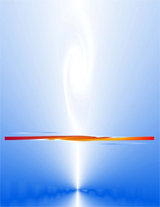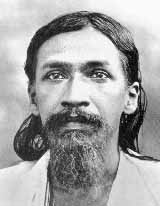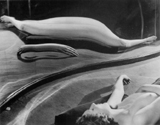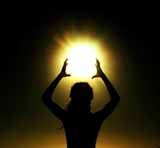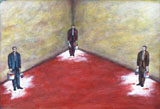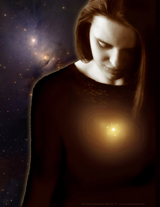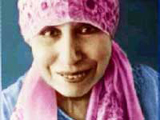Inner approach to health
A journey of the heart
Editor’s note
Each one of us is our own field of work. This is the first secret we are here to learn. In this article, we read the author sharing his discoveries just as a scientist shares with others what he has found. His insights correlate with some deep, mystical truths and that makes it even doubly enjoyable just as it is deeply instructive.
I often look upon life as a long passage home, where we have the opportunity to return to what we truly are in essence. It is this truth inside which secretly seeks expression. Each one of us has something new and inimitable, so it is only natural that every path assumes a unique route and context. Many will undertake considerable twists and detours and only a very few will reach their chosen destination in a clear straight line. But through it all, an unseen hand guides us through everything. At first hidden, it gradually emerges out of the shadows until the presence becomes much more tangible and concrete. From my perspective, it is fascinating to observe how the guidance slowly develops over time and is a voyage that will invariably take many lives. I feel that this guide is indelibly linked to our innate divinity and as long as we keep hold of this hand, our true essence will in time surely unfold and manifest.
Each one of us is also a living soul, but I believe that, at countless points, we choose to step outside this sanctuary. So the rest of our time is spent in trying to rediscover it. That is perhaps why Sri Aurobindo often compared living to a game of hide and seek. This soul (or rather, psychic being) embodies our truth, but realising this fact is not really enough. This Truth permeates everything; it is involved in every cell of our bodies and only seeks revelation. It strives to manifest in our lives in the fullest possible totality. So at the end of it all, I believe, stands the apex of our being, a vision of integral wholeness and it is our task to help make this vision a reality.
Frontiers of nature
Man has his nature too; it is the other player in the eternal game. But all too often, this element enshrouds the radiance of his soul. It in my understanding there are intricate relations between soul and nature. It is also evident to me that the soul will use any lever presented by our nature to manifest the concealed godhead that waits inside.
“All life, spiritual, mental or material, is the play of the soul with the possibilities of its nature; for without this play there can be no self-expression and no relative self-experience (1).”
Indeed, it seems to work through our nature and the heart, I feel, presents one such opportunity for this godhead to illumine the whole being. Speaking from experience, my whole rhythm seems to respond very precisely to the heart’s tune: it is as important as that. If the song is dull and mournful, the body can become limp and lifeless and all energy simply vanishes. If there is joy and love, the melody can galvanise the body even into a celebration of wholeness. Just a simple smile can ignite my day. More often than not though, the situation is ‘in between’ and that brings a similar consequence on the outside too. So it is now my understanding that the body resonates very faithfully and concretely to the vibration of the heart.
In a way, the heart seems to symbolise many of the diversities and extremes of our nature. Sri Aurobindo in The Synthesis of Yoga refers to the “double character of the human emotive being (2).” At its depths we find that “… there is in front in men a heart of vital emotions similar to the animal’s, if more variously developed; its emotions are governed by egoistic passion, blind instinctive affections and all the play of life-impulses with their imperfections, perversions, often sordid degradations, — heart besieged and given over to the lusts, desires, wraths, intense or fierce demands or little greeds and mean pettinesses of an obscure and fallen life-force and debased by its slavery to any and every impulse (3).”
Like the rest of our instrumental nature, initially at least, we find that the heart is impregnated with duality. It reflects the polarities of man’s façade. Reading Sri Aurobindo’s words, it is also clear that it is very prone to adverse influences. But at its summit I cannot imagine a more perfect funnel for the outpouring of rapture and love. Love is innate but requires expression and this is where the heart plays its role. Its location in the human system is surely no coincidence. That is surely why this natural proximity makes it, for many, the ideal gateway to the soul and the psychic being. This aspect represents the truth of our being and I believe that underlying any truth there is always love.
The true soul, Sri Aurobindo says, “… is in the invisible heart hidden in some luminous cave of the true nature: there under some infiltration of the divine Light is our soul…. There dwells the little spark of the Divine which supports this obscure mass of our nature and around it grows the psychic being, the formed soul or the real Man within us. It is as this psychic being in him grows and the movements of the heart reflect its divinations and impulsions that man becomes more and more aware of his soul, ceases to be a superior animal, and, awakening to glimpses of the godhead within him, admits more and more its intimations of a deeper life and consciousness and an impulse towards things divine (4).”
It is this aspect, a refined heart, almost as much as the mind, which can raise man above his animal nature: it simply lifts the whole being. As the Mother says, the heart has wings! The most powerful language known to man is love. That is why a pure heart can be such a wonderful gateway to the soul. Its impulse is to give unreservedly and this kind of action resonates deeply with the soul. A heart of this kind can easily find its place in the scheme of things. It understands the ultimate solution to the human condition: that man, beginning as a complex sum of jarring parts, can only be saved by the soul. Only this entity can make everything into a workable whole. The heart is perhaps more ready to embrace this and bow down before her sovereign Lord. Though it has a tendency towards complication, it does not possess the same pretensions as the mind. A pure heart is always humble.
Base camp
For me, any work inside always begins by establishing a connection, in a calling of the heart. That is my base camp. With persistence, the surface tensions gradually disappear and that opens the way to a felicity and joy. The heart begins to come forward and gradually soften and melt. It then starts to fuse with the psychic being and an inner alignment spontaneously emerges. I have found that any work undertaken without this foundation is totally futile.
This connection can then be allowed to spread outwards. By spreading the consciousness to the outer parts, a joy will then start to manifest in the body itself. For me, this is the challenge. Where there is stress, pain or friction, it is not always easy to invite joy to permeate the body. For instance, when the mind is pressing on the body to get to an appointment on time, it seems almost impossible. I then have to disengage from the drama and realign. I simply don’t have any alternative now. I have to stop and try to centre myself once more and start all over again.
Sometimes when I work inside I might get so enshrouded by the distortions of the nature that the heart will call for release. It wants that matchless peace that it finds at the conclusion of every detailed work inside. But the state gets withheld when the work of clearing has not been concluded, so the Mother might escort me down to a deeper recess that demands my attention. In a single sitting, I might witness a variety of extremes. She often takes me up to new heights or widens the consciousness to a vaster state. But there are inevitable plummets into the caverns of my nature. Always though, the process seems to end with a feeling of inimitable expansion and peace. The whole being will experience it and the heart’s call is finally answered and a feeling much deeper than joy will then spread over the being.
Calling of the heart
So it is the heart that knows how to call. Whenever I work inside, it is my first point of contact. It opens the door to any dynamic work and changing the nature, including the body, must surely be the ultimate dynamic process. When the heart prostrates itself in a yearning of love, I find that the work seems to automatically unfold. Without this love I believe that there can simply be no contact: ours is a path of surrender after all. At least that is my experience. It needs the spontaneous and candid trust of a child for his mother. There is such a magical sweetness to this work: I feel so entirely alone with Her. Love often brings a sense of delight and delight then raises the whole being up to a pinnacle of supreme wholeness. It elevates the physical to an entirely new frequency. So it is not only the Truth that transforms. Love surely has the same capacity, perhaps even greater, but, at man’s present stage of growth, it is still tainted with distortion.
That is because the innate purity of the heart is still gagged by an urge for reciprocity and exchange. As the Mother says, it still founds itself on ego and self-interest:
“If human love came forth unalloyed, it would be all-powerful. Unfortunately, in human love, there is as much SELF love as love for the beloved; it is not a love that makes you forget yourself (5).”
That is why Sri Aurobindo often asserted that the Truth must settle first for the fullest manifestation to become complete:
“To bring the Divine Love and Beauty and Ananda into the world is, indeed, the whole crown and essence of our yoga. But it has always seemed to me impossible unless there comes as a support and foundation and guard the Divine Truth — what I call the supramental — and its Divine Power…. It is when one has felt this descent that one can be really an instrument for the birth and action of the Divine Love in the world (6).”
So if we can somehow drop everything for this love, the emotion will surely become more refined. I believe that it can raise man to an entirely new vibration. Because of this, I find it the ideal portal for the Mother’s work to fully ensue.
Truth and love
Love is surely the language of the heart but it is evidently very open to distortion and that is why Sri Aurobindo and the Mother frequently use the term ‘human love’. Love is probably the simplest of all emotions. Indeed it is so simple that man cannot really claim a monopoly on it. Ironically man, the mental being, twists and distorts it so much that the end-result can become truly perverted.
In my eyes, it is only the Truth which can transform human love into divine love. However I have always felt that love, in its essence, is a state totally unaffected by duality. It is one of life’s few absolutes. But the Truth has a remarkable effect on this kind of love. It is a role of Truth to remove all distortion so every time human love reaches out to our truth, the soul, its contents somehow become less mixed. Each time it gets more purged of its lower movements. I find then that the emotion starts to take on a new character. It begins to assume some of the characteristics of what it touches. It also becomes more and more disinterested. That is the beauty of identity; it gets moulded by its master and becomes naturally refined into a truer image.
The process, as Sri Aurobindo says, does not necessarily entail elimination but can be one of refinement and transformation:
“And let me say also that, as regards human love and divine Love, I admitted the first as that from which we have to proceed and to arrive at the other, intensifying and transforming into itself, not eliminating, human love. Divine Love, in my view of it, is again not something ethereal, cold and far, but a love absolutely intense, intimate and full of unity, closeness and rapture using all the nature for its expression. Certainly, it is without the confusions and disorders of the present lower vital nature which it will change into something entirely warm, deep and intense; but it is no reason for supposing that it will lose anything that is true and happy in the elements of love (7).”
Even in small degrees, I am fortunate enough to be able to observe a little of this process here*. First of all, it is very evident that it is the Mother who personally presides over these environs with Her unique felicity and love. When the heart rises in frequency, I can tangibly feel the total Grace of this care and protection. Moreover it is a love deeply embedded in all that is true.
But when I first arrived I found the atmosphere here almost bone-dry! Arriving from the West (and parts of India too), it was easy to somehow confuse passion with love; love to me implied rather grandiose gestures. Without any of the cloying sentimentality with which it usually gets mixed, the content initially seemed non-existent. Stripped of these two features (though not always), there didn’t seem to be very much left. The love that presides here seemed almost parched when shorn of the more lurid tongues of desire. Love to me in the past might have been compared to a rollercoaster ride. It was what I had come to expect and it didn’t really feel complete without it.
Something about this new feeling, though, did stand out as being very special: a colossal work was clearly being done. But I found that it needed a distinct shift in consciousness to connect with this new aura. In time, by and large, I have become increasingly enamoured with this atmosphere: perhaps now it is even in my veins. This all-pervading Love, for me, is now the essence of this place and I presently find that I have become completely dependent on it. It is the Mother’s Presence. To be frank, it is what sustains and keeps me going. Without it, I would probably be little more than a moving corpse. It is invariably the first thing I attune to when I return and whenever I am away I miss it desperately. So living here gives me the chance to get a little closer to this special vibration. So I now realise that love, at its source, has little to do with the vital, let alone its ego. That is why, in my opinion, its emotional centre, the heart, serves better as a conduit or means of expression for this immense force.
A little of all this seems to rub off on some of the people here too. It is not a love which tends to lean on postures and platitudes and, to a degree, it can be almost undemonstrative and understated. So often the feeling of love gets degraded by ostentatious expression. Thankfully too, a truer vibration also proliferates in many parts of the world. It is still a great deal more subtle and refined than my background had taught to recognise as true love. Initially at least, I found it didn’t nourish the baser parts of my nature and one unhealthy consequence was that I might sometimes have found myself getting grey and dry. Maybe too it’s a lesson I’m still learning. If I’m honest with myself I try to view the scenario as just a sign of the vital being cleansed of its more unwholesome ingredients! It is clear indication that it is not getting everything its own way.
A reflection
It is very evident that emotional well-being has an immense influence on our entire health. It is more than simple human psychology.
We need only recall a time of ‘falling in love’. Whatever its quality and content, I certainly experienced considerable joy and the current galvanised my energies to a remarkable degree. The metaphor of being ‘swept off one’s feet’ is often used with good reason. The body positively vibrated to this welcome force, a little like an elixir that brought me back to a state of near wholeness and youth.
Unhappily though, I found the effect disappointingly transient. This is hardly surprising: if the love itself is inherently flawed then its mark on the nature and particularly the body is never going to be permanent. Looking at the emotion candidly, this kind of love usually masks a very subtle trade and, as such, there are always going to be losers. So when the euphoria passes there often comes a slight feeling of diminution and depletion. I guess that the conclusion for most people is a state on the borders of adjustment and compromise. Sometimes it consolidates and even deepens but a ‘middle ground’ is invariably fixed. I don’t feel this at all startling as the initial feeling is sometimes based on little more than infatuation. Perhaps man (or woman for that matter) often falls in love with the idea of being in love and so erects an image of what he yearns to be in love with. That is the nature of expectation and I don’t believe that such artificial yardsticks can ever be maintained. The feeling of novelty gradually passes and, as a consequence, the whole being is never usually able to recapture that glow and lustre it had found when the feeling was in its infancy.
This kind of ‘glow’ is always the sign of a healthy vitality. But a healthy vitality can surely not persist if one lives in the vital consciousness. The vital is, at best, a good instrument but in the Mother’s eyes a dangerous master. I believe that if we pitch camp in this zone, we only expose ourselves to massive extremes of duality and deep pits of despair. In short, the vital will become our ruler. The only solution is to try to move to a much higher determinism: the domain of the soul.
No quantum leap
Nevertheless, these incursions into human love did prompt me to probe deeper into the curative power of love as a whole. Love has many gradations and I am now convinced that by rising to a higher frequency its effect can be more sustaining and true. To reach this point, one has to understand and try to embrace the concept of ‘true’ love. It is no mean task. Some might justifiably claim it to be an impossible summit to reach. But if it is our nature to love, do we really have any alternative but to follow this path? Up above stands a lofty ideal and it can only be attained in gradual degrees. From man’s cloudy imitations, there can rarely be a quantum leap to this state. And it is very obvious that to love truly, one must be totally embedded in the Truth. This brings us back to Sri Aurobindo’s affirmation: the truth must be established first.
True love, for me, has a totally different vibration than human love. It is like a steady flame which radiates in any given circumstance. Furthermore it stations itself far above passion and desire. Ironically, it is probably passion which ultimately takes away the very strength and power of love. True love is surely free of all duality and self-interest and it doesn’t take a degree in psychology to realise that behind every passion and desire lurks a titanic ego. And how many of us can profess to have shed all ego? It is so embedded in our fabric that most of us don’t even know how to make the shift.
In its role as a channel, the heart can certainly drag down the physical too. Our emotional state clearly reflects in our bodies and often it is the turbidity of this part of our nature which can so damage our outer frame. If I am in a state of emotional turmoil I find that the body can find itself easily tied up in knots.
I readily admit that the vital consciousness has considerable resources. But complete harmony must surely depend on raising the level of consciousness in which one chooses to live. So when one exists in the vital, one has to feed on the raw material of life. I admit that I had flirted with this realm in the past and I used to find this ‘vital fire’ sometimes gave a substantial spur of energy (though with inevitable payback), but now the ‘adrenalin factor’ has simply disappeared. Somehow, in the competitive jungle, I must have perceived it as a means for survival.
So it can often be a difficult transition to this higher vibration, at least for the body, and there is an immense gap in between. But ultimately this higher vibration must provide the key to our balance and health. To achieve this, the body must surely be founded on a platform of calm and equality and not the swings of our vitality and passions. A careful balance must still be maintained because it would be madness to shun the life-force altogether: like the rest of our nature, it simply has to be transmuted. For some, I guess, the transition should be more gradual. Eventually though, through the agency of the soul, a dynamic peace can surely be evoked and it is my impression that its very bedrock is invariably one of static calm.
Proper station
We are, amongst other things, creatures of love and so one would have thought that the heart would be the noblest part of our nature. I suppose very often it is, but it can very easily slide down from its proper station. It therefore requires constant refinement. It is not an infallible guide, far from it. In order to find this, we must go deep inside its recesses to realise its true base. I also believe that the vital nature should never be suppressed. This is a path of harmony, not of artificial exertions and by continually attuning it to the vibration of the soul, it can slowly get transformed into a more psychic image. This transition can particularly apply to the heart. Sri Aurobindo asserts:
“The heart is the centre of the emotional being and the emotions are vital movements. When the heart is purified, the vital emotions change into psychic feelings or else psychicised vital movements (8).”
Our body depends on this kind of stability and equilibrium and nothing throws it into imbalance more than giving way to any kind of extreme duality. Anger and hatred are two such emotions that severely compress and choke our nature. Of course, there are many others but these two villains can twist the heart into a hideous shape. It is, of course, well known how quickly our ‘love’ can turn into hate.
Heart and desire
The heart can be influenced by many wrong movements and damaging influences and it is evident to me that the heart is prone to desire. In man’s eyes, one might ask, what is love without desire? The two terms have almost become synonymous. So this journey of the heart is obviously not without difficulty. Sometimes it seems as if I’m trying to walk along a very long tightrope. Surely it is the Grace of the Mother that keeps me aloft!
In the human system too, there is a certain proximity between the seat of love and that of desire. Although standing just in front of our psychic centre, the heart is also only a few steps away from the clutches of the lower vital. Sri Aurobindo gives its location here:
“The place of desire is below the heart in the central vital (navel) and in the lower vital, but it moves the emotion and the vital mind (9).”
The heart is also our centre of joy. When joy rises here, I find that the whole being resonates with a thrill of exultation. Joy can truly lift the body but a moment later, I sometimes find that the ‘desire soul’, as Sri Aurobindo terms it, might intervene. It’s not easy to sustain this joy unless something new takes over. If not, I might detect a degree of impatience later intruding too. It seems our emotions are rarely able to defy the laws of gravity. The heart can even be taken captive by this pull and this is hardly surprising as joy is principally a vital emotion. But, at this point, if I can choose to make a conscious connection between the feeling and my true centre inside, the emotion can be moulded and enhanced into a more refined image. That is the imprint of the soul. It proves the value of vigilance too. At that time, might it perhaps pass beyond mere emotion and cross the threshold to Ānanda, the divine Delight? It is clearly a work of constant realignment.
Nature of desire
The main difficulty with desire, I feel, does not come from its very existence. It is a part of nature and one of the chief supports of the superficial existence. No, the major problem with desire seems to come from how we deal with it. There is perhaps a way of acknowledging its existence without accepting its validity. But usually it brings chaos in its wake; it can even cause madness. Because we don’t use the proper means to deal with it, it can cause massive disequilibrium in our being. Moreover the stakes seem to get much higher as we enter a path of growth, the effects on the body can get more damaging the higher one climbs. Without a sincere surrender, obstructive forces can intrude on our progress and desire is one weapon they can use to devastating effect. If there is a religious leaning in an individual, that person might decide to embark on a moral crusade with very damaging consequences. But in my opinion, the idea that desire is ‘bad’ must surely be erroneous. It is almost like classifying nature as ‘bad’ but it is a fact of life.
There are various choices we can make. We can either decide to succumb and just let it possess us. For obvious reasons, this course is not to be recommended. If we yield, we simply become a manifestation of desire. In this context, the heart would simply become its slave and the body would sink into an abyss. Usually, though, there is something in us which refuses to go over the brink. So most people tend to reach a kind of accommodation with this state and that is usually a tactic adopted in what Sri Aurobindo terms the ‘ordinary life’. It is a delicate game of checks and balances and the net result, I guess is, not surprisingly, very ordinary. I maintain it is a matter of coping and not really resolving.
Many, when embarking on a more meaningful path, may often choose to ‘fight’ it. This is perhaps the most foolhardy choice of all. The usual agent is the ordinary mind and a common means it will try to use is suppression. It will try to starve the vitality of all desire. This is the ascetic way. It deprives the vital of one of its principal means of sustenance and any semblance of energy gradually fades away and, perhaps eventually, even dies. Adding an ethical twist can further aggravate the process. Self-judgment can have fatal consequences. Fighting is not conducive to our inner balance unless the ‘malaise’ can be conquered but conquering nature head-on is not so easy. Perhaps it is impossible.
So instead of putting desire, for instance, into a corner I feel it is much more productive to try to look above and beyond it. Better still, we can disinterestedly look inside the movement to enquire why it keeps arising. But it takes a great deal of awareness and detachment to succeed in this. I feel that it is always important to look at any distortion from a higher station. We can always observe it as just another wave that has entered from outside and, like all waves, it will surely pass. However, it is highly contagious and much vigilance is required. But with a sincere will, I believe that the attention and consciousness imposed from above will eventually prevail. I don’t think there can be half-measures, so one needs a steely resolve to go right through to the very end.
Control of the soul
Our nature will never be abolished but it can certainly be harmonised and brought under the control of the soul and this surely is the only failsafe way that desire can eventually be overcome:
“And yet the true emotive soul, the real psyche in us, is not a desire-soul, but a soul of pure love and delight; but that, like the rest of our true being, can only emerge when the deformation created by the life of desire is removed from the surface and is no longer the characteristic action of our being. To get that done is a necessary part of our purification, liberation, perfection (10).”
The whole transition can take time but in unlocking this secret we surely begin to realise its function as the true guide and master of our lives. Thankfully though, our path is also one of surrender so we can have our focal point in the Mother. By giving ourselves we can indeed transcend nature; She then becomes the guiding light of our lives and in the end we no longer have to rely upon the stress of our personal effort. I know that She is present in every soul and behind every heart. I believe that there is no better way of finding Her than through love. When this happens, the heart comes to the front, becoming less a hindrance and more a guarantee of our eventual victory.
Joy in the body
I believe that joy can be experienced in the body under all circumstances. It comes from the heart and spreads over the rest of the being. This joy arises when everything finds its true place. The body is the last outpost, if you like, and it touches this joy when each part of our nature finds its proper role. I pray that this joy, particularly in the body, can be experienced up until the time I draw my final breath.
But joy, for me at least, can still be a transient state. It can easily get clouded by the other movements of my nature. Furthermore, as Sri Aurobindo tells us, something far greater than joy is present in every cell of our bodies. Surely joy is the heart’s expression of gratitude for this existence. It is also a celebration of life and body and I see no reason why it can’t exist alongside the supreme felicity.
I owe a lot to this body. So why shouldn’t it receive joy? Whatever its parameters, I can’t imagine the Mother giving me a better instrument, given my stage of growth. To be honest, most of man’s physical complications seem to be superimposed by other parts of his nature. And the more he grows, the more evident these seem to become. They come from outside too but the way our mind reacts can also often prove injurious. From small beginnings it comes down to one simple fact: that the body is not ‘me’ and is simply a garment that is transferred from life to life. I believe that it is this misplaced identification that is responsible for many of man’s woes.
The way of the heart should always be filled with this unalloyed joy. But we all know that the reality is so often different. It can perhaps be a long voyage to reach this ideal. The heart, perhaps more than other parts of our being, is subject to the caprices of duality and so can swing violently from one extreme to another. It is prone to false dawns of exultation and can go right down to the most savage loathing. These kinds of swings, I am convinced, do not help the body. Far from it, as the body seems to yearn for a more consistent vibration. That is why the steady flame of the psychic is always its staunchest ally. The body seems to squirm away from uncertainty; it depends on regularity. Unfortunately though, this term can sometimes horrify the baser parts of our life nature. Man is made of many divergent parts. So it is now very clear to me why the Mother has made harmony her aim.
Relationships
One of my greatest challenges is to remain in my truth when the atmosphere and company around me is so oriented onto the surface. I find this is particularly evident with relationships that go back many years because these grooves and patterns of behaviour often become so ingrained. I often find that it is particularly the oldest relationships which offer our greatest lessons in life. But if we yearn to live from inside, how should we respond when we find ourselves getting cramped and hemmed in by the façade? It is a very subtle falsehood and a game which throttles. It can sometimes put us in a very narrow mesh. Looked at squarely, it is a game of pretence and seems to be particularly prominent in relationships from within the family. Sometimes it amounts to no more than social habit but its effect can be very draining. It’s like we’re always choosing to live inside our comfort zones and are terrified of transgressing them. When confronted with this constriction, I might feel myself shrinking and experience all vitality simply draining away. It can also leave the heart dry and grey, depleting the body of all its energy.
As an option, I might try to take the initiative and let out my innermost aspirations but the reaction will probably only be one of disbelief and the result will probably be horrendous. It is only on rare occasions that I am able to do just that. Mostly the atmosphere (and my state) is likely to be so unhelpful and any effort will become contrived and frightfully marred; it won’t be a truly spontaneous response. When you are confronted by certain energies it is surely better to adjust, at least on the exterior, to these kinds of energies. I believe that is the way of harmony.
It is essential to maintain self-awareness. If I succeed in remaining attentive I can observe at the critical time just how and why I am reacting in this uncomfortable way. I can observe what is making me shrink. The façade is not so important. Perhaps it is better to maintain it as self-protection but to keep that light of awareness burning inside at all times is one sure way of expanding in even the most adverse circumstances. This is fascinating work but I do not find it easy at all. When everything is pulling me onto the surface, it sometimes takes a monumental effort to maintain my true ground. Ultimately though, I believe it is when all effort desists that our true station can be found: it is simply a matter of consciousness.
If all else fails, I find that the most effective and simple way of keeping this poise is to silently call the Mother. It is only She who can keep that love flaming at all times. I also find it the best way of maintaining my lifeline with the soul. The ability to inwardly smile when in hostile or uncomfortable surroundings is very necessary on this path. In time, if I persist, I am convinced that the Truth will consistently radiate outwards. Until this lesson is learnt, we can be sure that the scenery will never really change. If we depend on outer supports to stay upright, we too become a little like a prop ourselves. We will also become superficial and narrow, more like an empty shell. Until we learn that we are, in entirety, a living soul nothing is really absorbed. We must tend our inner light at all times. If we can keep that inner connection I am convinced nothing can ever derail us.
That is why I believe that each of us has at least one relationship in life that presents us with such difficulties. In truth, this relationship is our greatest teacher because, if solved, it may even unlock the gates to a glorious freedom. I might go even further: this person that so cages us in, for whatever reason, is perhaps our greatest friend. A true friend, after all, will only help us grow. It is like an examination that we have to pass. If we understand this simple fact, our love can surely expand and somehow illumine whatever it touches. It is a matter of holding onto what is true, regardless of what we perceive as false outside.
Heart and habit
I sometimes used to wonder why I used to feel so trapped by my emotions. At first, they might have appeared quite spontaneous but the regularity and repetition with which they arose made me think. Anger, for instance, seems to be, on the face of it, a fairly instantaneous outburst, but the channels that usually lead to it are actually controlled by habit. There seem to be ‘trigger points’ which prompt the same routines. Not surprisingly, initially at least, I noticed the negative grooves much more, but really it can also work in a positive vein too. I guess that habit is always going to be a factor if we remain in the realm of dualities. From reading Sri Aurobindo particularly, it is quite clear that our emotional responses are usually as ingrained in habit as the mechanical nature of the body itself:
“When it [action of the mind] is struck by the world’s impacts from outside or urged by the reflective powers of the subjective inner being, it throws up certain habitual activities, the mould of which has been determined by our evolution. One of these forms of activity is the emotional mind, — the heart, as we may call it for the sake of convenient brevity. Our emotions are the waves of reactions and response which rise up from the basic consciousness, cittavritti. Their action too is largely regulated by habit and an emotive memory. They are not imperative laws of Necessity; there is no really binding law of our emotional being to which we must submit without remedy; we are not obliged to give responses of grief to certain impacts upon the mind, responses of anger to others, to yet others responses of hatred or dislike, to others responses of liking or love. All these things are only habits of our affective mentality; they can be changed by the conscious will of the spirit; they can be inhibited; we may even rise entirely above all subjection to grief, anger, hatred, the duality of liking and disliking. We are subject to these things only so long as we persist in subjection to the mechanical action of the Chitta in the emotive mentality, a thing difficult to get rid of because of the power of past habit and especially the importunate insistence of the vital part of mentality, the nervous life-mind or psychic Prana (11).”
By comparing Sri Aurobindo’s insights with our own experience, we can surely discover how this passage makes such sense. It also explains why our emotional nature often keeps coming up against the same dead-ends. All too often though, we are able to recognise these patterns more readily in others than in ourselves. We get so immersed in our own dramas and end up entangled inside a very confused web. But most of the time we go on repeating the same patterns and do not realise that we are not much more than mere slaves. Sometimes we may even need to get to the point of emotional breakdown to understand how severely these negative grooves affect us. Surely it is only by stepping outside (and certainly above) the phenomenon that we can understand and that is probably why a severe ‘shake’ is sometimes needed to induce a necessary change of station. The keynote is surely consciousness.
Freedom
I believe that our nature secretly waits to be free. Implanted in it is the divine seed and it only yearns to grow to the fullest possible splendour. So it stands to reason that physical and psychological freedom is incompatible with any form of habit. I don’t think anything less can be regarded as integral health and surely transformation can only work in such an atmosphere of liberation. The nature must be taught to freely give itself and perhaps nothing can give more than the love of the heart.
Thankfully, there is one part in each of us that implicitly understands this. The moment we choose to live in the Truth we stop being slaves and begin to understand what it means to be free. By aligning ourselves to its centre, the soul, this ideal can become something of a reality. The Mother has often said that perfect freedom can only be achieved through surrender. This brings us back to the heart once more. It surely takes a simple heart to surrender: it can be such a boon. A single impulse will surely amount to more than any monumental austerity or effort. That is its way. Whatever its failings, a simple heart can only give and there is no more perfect gift than one’s self.
And so we reach full circle. Life, being a passage home, is ideally a return to the truth of our nature. But then, once the nature is fulfilled, Sri Aurobindo affirms, its boundaries simply vanish:
“There the soul lives without any boundaries; for it uses all forms and moulds according to the divine Will in it, but it is not restrained, it is not tied down, it is not imprisoned in any power or form that it uses (12).”
At this point, I guess, man shall find himself on the threshold of transformation. Soul and nature will become one. Surely our heart secretly yearns for this too! Cradled in its Mother’s arms, the whole being can at last bathe in this supreme fountain of joy and love.
References
1. Sri Aurobindo. SABCL, Volume 20. Pondicherry; Sri Aurobindo Ashram Trust, 1971, p. 419.
2. Ibid. p. 140.
3. Ibid.
4. Ibid. p.141.
5. The Mother. Mother’s Agenda, Volume 1. Paris; Institut de Recherches Évolutives, 1978, p. 187.
6. Op. cit. SABCL, Volume 23. Pondicherry; Sri Aurobindo Ashram Trust, 1970, p. 753.
7. Ibid. p. 755.
8. Op. cit. SABCL, Volume 22. Pondicherry; Sri Aurobindo Ashram Trust, 1970, p. 342.
9. Ibid.
10. Op. cit. SABCL, Volume 21. Pondicherry; Sri Aurobindo Ashram Trust, 1970, p. 622.
11. Ibid. pp. 621-2.
12. Op. cit. SABCL, Volume 20. Pondicherry; Sri Aurobindo Ashram Trust, 1971, p. 202.
Mr. James Anderson, a sadhak, is following the Yoga of Sri Aurobindo and working at SAIIIHR, Pondicherry.
Share with us (Comments, contributions, opinions)
When reproducing this feature, please credit NAMAH, and give the byline. Please send us cuttings.

